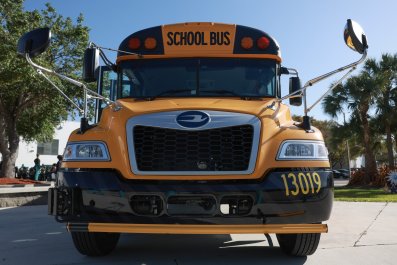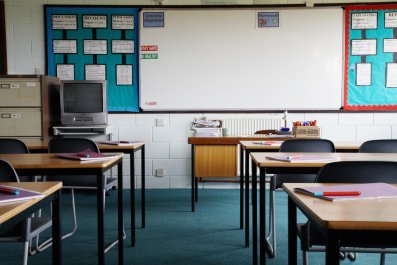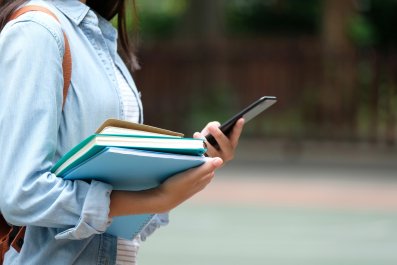New York Governor Kathy Hochul is planning to introduce a bill banning smartphones in schools, the latest high-profile effort in a national push to improve online safety, mental health and academic performance for children.
"I have seen these addictive algorithms pull in young people, making them prisoners in a space where they are cut off from human connection, social interaction, and normal classroom activity," Hochul told the Guardian newspaper in an interview Thursday.
The governor plans to officially bring up the bill later this year, aiming for it to be addressed in New York's next legislative session starting in January. If passed, students would be permitted only to carry simple "flip phones" capable of texting but without internet access.
"Social media is a silent killer of our children's generation," Hochul said. "We have to help the kids we're hurting right now."
Supporters of the bill highlight the links between smartphone use, bullying and social isolation, emphasizing the need to keep students focused on schoolwork during class Hochul pointed out that addictive algorithms often trap young users on platforms, harming their development and mental health.
In addition to social media, teachers around the country have complained that students spend time in class watching movies, shopping and even gambling during instructional time.
The movement to regulate children's online activity — at least while they're in school — is gaining traction nationwide. New York's proposed bill, part of a broader campaign by the governor to tackle mental health, includes two other bills aimed at safeguarding children's privacy online and limiting their access to certain social network features.
This bill is the latest in a series of state-level efforts to ban or restrict smartphone use in the absence of a federal law.
States like Florida have passed strict rules banning student cellphone use and blocking social media during class, with some districts extending the ban to the entire school day.
Other states, including Minnesota, Hawaii, Illinois, New Mexico, South Carolina and Nevada, have proposed similar bills. Maryland and Vermont passed their "Kids Code" bills earlier this year despite opposition from social media companies.
A week ago, California's State Assembly voted unanimously to ban smartphones in public schools. The bill is now moving through the State Senate and could be signed into law by the governor as early as 2025. California has some two million students enrolled in its public high school, the most in the nation.
Supporters of these initiatives have cited benefits like better academic performance, but research is still limited. Some experts argue that integrating technology into teaching methods rather than resisting it is a better approach, especially as students continue to face challenges from closures during the pandemic.
"Returning to in-person, I think it was hard to break the habit," said Victor Pereira, a lecturer at Harvard's Graduate School of Education.
The ban on phones in classrooms has been opposed by some students as well as parents, who worry they will be unable to reach their children in case of an emergency like an active-shooter scenario.
In February, students at James Madison High School in South Houston, Texas held a protest with signs reading "We are high school kids, not cellmates!" and "You are not here to imprison us or confine us."
One of the fiercest opponents of these bills has been Meta, which has spent over $150,000 lobbying against such regulations. Dayna Geldwert, a public policy manager for the Facebook parent, argued that varying state laws create inconsistent standards and complications for parents.
"The challenge is that these social media laws will hold different platforms to different standards in different states, leading to a mess for parents," Geldwert said.
Despite these challenges, Hochul said she is determined to push the legislation forward. "We stopped marketing tobacco to kids. We raised the drinking age. And today, we're fighting to protect kids from the defining problem of our time," she said in a statement provided to Newsweek.
It was not immediately clear how the proposed legislation would enforce a statewide phone ban in schools. While more than three-quarters of U.S. schools say they prohibit the use of smartphones for non-academic use, according to the National Center for Education Statistics, enforcement is another matter.
Many educators say they've only had success by physically removing students from their phones during the school day, either by making them put their devices in lockers or Yondr pouches, magnetically sealed neoprene cases that can only be unlocked with a magnetized master key that's typically kept by teachers.
Known as "phone prisons" to many students, there are tutorials and videos across social media that purport to show how the Yondr pouches can be opened or "hacked" without the magnet.
Disclaimer: The copyright of this article belongs to the original author. Reposting this article is solely for the purpose of information dissemination and does not constitute any investment advice. If there is any infringement, please contact us immediately. We will make corrections or deletions as necessary. Thank you.




